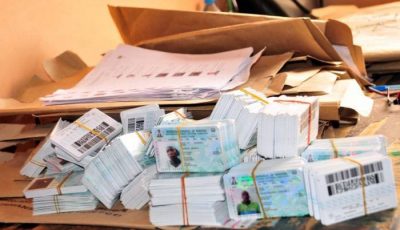The Chairman of the Independent National Electoral Commission (INEC), Mahmood Yakubu, on Thursday said that no one will be allowed to vote in the general elections without a permanent voter card (PVC).
Mr Yakubu made this known at a conference organised by the National Association of Judiciary(NAJUC) with the theme: “2023 General Election: Judicial and Sustainability of Nigeria’s Democracy”.
“There is a very disturbing trend which is the misinformation and disinformation on technological deployments by the commission in the social media space and some media houses picking up news bulletins on social media platforms to discuss on their morning shows and political programmes without reaching out to the commission for its stance on such issues.
“One of such is the recent viral assumption that PVC is not required to vote on election day. Let me reiterate the commission’s stance that Section 47 (1) of the Electoral Act 2022 clearly states that;
“A person attending to vote in an election shall present himself with his voter’s card to a presiding officer for accreditation at the polling unit in the constituency in which his name is registered.
“Therefore, the commission is legally bound to only accept accreditation of a voter on presentation of a valid voter’s card.
“I urge media houses and journalists to always reach out to the commission to avoid spreading misinformation and disinformation obtained from viral social media posts.”
The electoral body chief said that the commission on its part had an active social media presence and would continue to do its best to educate Nigerians and debunk such type of misinformation.
He was represented by Lawrence Bayode, Director ICT in the commission at the event.
Speaking further, the INEC chair said there was no provision in the Electoral Act 2022 that gave the commission the option to register voters to vote using the digits on the Voter Identification Number (VIN).
He further assured Nigerians that the Bimodal Voter Registration System (BVAS) was secured and that the commission had been repelling attacks from hackers.
He said that the BVAS technology would be deployed to actualize a credible, fair and hitch-free general election.
“As with every aspect of our national lives, adopting technologies into the electoral process is always met with challenges.
“One major challenge was the lack of a clear-cut legal framework supporting the deployment of technology by the commission, especially in the accreditation of voters and the voting process.
“The deployment of the Smart Card Readers in 2015 and its use was faced with various challenges such as resistance to use in some isolated instances, snatching and destruction of devices, attempts to manipulate the use of the devices, and most prominently various judicial pronouncements on the legality of its use.”
Also speaking, Elizabeth Olorunfemi, Assistant Research Fellow, National Judicial Institute, (NJI), in a paper presentation on “The Role of the Media in Election Reportage” noted the need for the media to cross check facts with the electoral umpire before publishing.
The Chief Judge of the FCT High Court, Justice Hussein Baba-Yusuf, noted that the judiciary and the media were partners in progress and must work together to ensure that the country’s democracy was sustained.
Mr Baba-Yusuf, who was represented by Justice Olukayode Adeniyi , said that the judiciary was always ready to deliver on it’s constitutional mandate.
(NAN)


